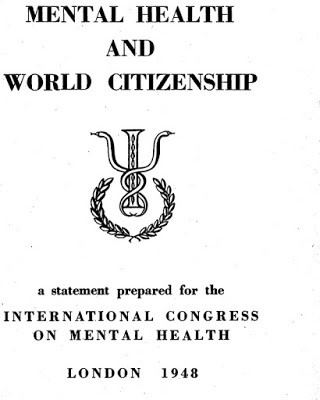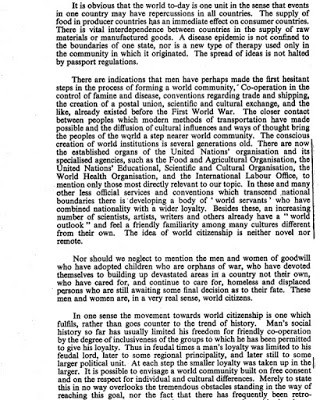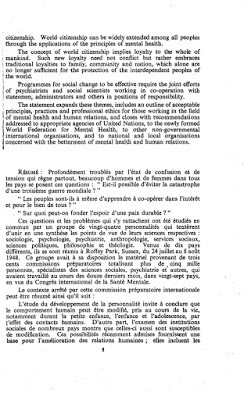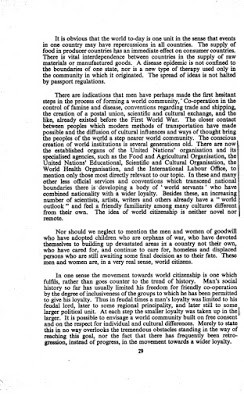MENTAL HEALTH AND WORLD CITIZENSHIP
The fact that men and women everywhere are looking for guidance in world affairs, as well as in dealing with the problems of their own community, constitutes the greatest challenge ever presented to social scientists and psychiatrists. Two world wars in a single generation, and the possibility of a much more devastating one in the not distant future, have made clear to everyone the urgency of the crisis. More directly and more clearly than ever before, the question must be faced as to whether survival is possible without adapting human institutions so that men can live together as world citizens in, a world community, in which local loyalties are rendered compatible with a wider allegiance to mankind as a whole. The idea of the " world citizen," as here conceived, is not used in a political sense. It is rather meant to convey the notion of a " common humanity." It does not raise the question of a world political sovereignty, replacing or embracing the sovereignties of existing nations. Such a new sovereignty may come, but it is not the concern of this statement. We are concerned with the attitudes and ideals of groups of men in relation to one another, and with the principles and practices of mental health in relation to a world community.
This relation is a complex one, and a description of its complexity seems at first sight to make any constructive activity in the field of world citizenship impossible. On the one hand, a world community is a condition for mental health in a world threatened with destruction. On the other hand, there can be no world community until individuals and groups have learned how to live at peace with themselves and one another, and until they have ceased to struggle for their own sense of group solidarity at the expense of hostility and violence against others. "No peace without mental health," we seem to be saying, and, at the same time, "no mental health without peace." Is there any way out of this apparent circle? There is another apparent circle, closely related to the first, and equally perplexing. We have referred to the "plasticity " of man, as something from which we could take hope, and at the same time we have indicated the extent to which the growing human being is influenced by the society in which he lives.
There seems to be an unbroken chain of inter-action extending from the social, economic and political attitudes of a given community through the participation of the adult members in the life of the group, and so to the individual family, which in turn hands on its customs and traditions to its children, who then perpetuate the attitudes which they have learned. This behaviour in the great variety of forms in which it appears in different cultures must be altered if new loyalties are to emerge and wider ties be developed.
At what point in this complex of human activities can this alteration take place? At what point in the whole pattern of mobilisation of manpower, indoctrination through press and radio, manoeuvring among diplomats, bartering and bargaining among those who control the world's resources, can the methods on which the mental health approach is based, be used? Where is our point of intervention? This circle, we know, is not complete. Social institutions and patterns of behaviour do change; they are changed by men, and men change with them. The changes are sometimes slow, sometimes fast, but they do occur, and an understanding of the process of change may make it possible
to intervene at least to some extent in the direction of better human understanding.
Our ability to indicate ways of intervening is based upon our knowledge of the conditions in which learning takes place. We can then ask, in what ways, under what circumstances and at what times, can people learn the new attitudes which are relevant and essential for membership in a world community?
How must these methods of learning be adjusted for peoples with different cultural backgrounds, living within specific frameworks of ideas and ideals? Where, and when, in each society will it be most efficient to concentrate the new learning experiences; at what levels of society, and among which groups of policymakers or community leaders? We already know a great deal about how children learn their attitudes of hostility or co-operativeness, their habits of wide or narrow loyalty. We are beginning to find out how adults, building on their childhood experience, can develop attitudes appropriate to this new period in history.



 illuminati leaks
info on the free and accepted masons
current nwo plans
the latest on the Rothschild family dealings
current events of the CFR
the last move of the Trilateral Commission
videos of nwo protest
nwo canceled plans
tasks abandoned for nwo due to public outcry
the decline of Royal Society influence
Rockefeller fears - nwo not possible to acheive
consideration for the revocation of Jade Helm and Agenda 21
illuminati leaks
info on the free and accepted masons
current nwo plans
the latest on the Rothschild family dealings
current events of the CFR
the last move of the Trilateral Commission
videos of nwo protest
nwo canceled plans
tasks abandoned for nwo due to public outcry
the decline of Royal Society influence
Rockefeller fears - nwo not possible to acheive
consideration for the revocation of Jade Helm and Agenda 21










